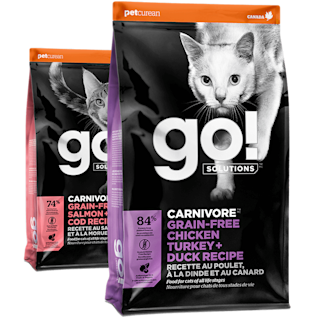March 21, 2025
Can Cats Eat Eggs?

Eggs are a staple in many households—nutritious, delicious, and versatile. But can cats eat eggs, too? If you’ve ever caught your feline friend eyeing your breakfast plate, you’re not alone. Let’s break down whether eggs are safe for cats and how they can benefit your furry companion.
Are Eggs Good for Cats?
Yes, eggs can be good for cats! They’re packed with high-quality protein, essential amino acids, and healthy fats3 that can support your cat’s muscle development, coat health, and overall energy. Eggs also contain important nutrients like vitamin A, vitamin B12, and riboflavin3, which contribute to your cat’s well-being.
In fact, the nutritional benefits of eggs are why they’re often included in many high-quality cat foods. Their protein content is highly digestible, making them a great addition to a balanced diet.

Recommended Solution
Protein-Rich, Premium Quality Cat Food
Specially designed for high-energy felines, these grain-free, protein-rich recipes deliver robust nutrition with an assortment of premium animal proteins including whole dried egg for a healthful, hearty meal.
View all Carnivore cat food recipes
Can Cats Eat Raw Eggs?
No, it’s not recommended to feed cats raw eggs. Raw eggs carry the risk of salmonella and E. coli contamination2,4,5, which can cause digestive upset or more serious health issues in cats.
Salmonella can also be spread from pets to their human companions⁵, so it’s important to not feed raw eggs for the health of your family, as well.
Additionally, raw egg whites contain avidin, a protein that can interfere with biotin absorption1,2, potentially leading to skin or coat problems. If you’re considering giving your cat eggs, always cook them thoroughly to eliminate any harmful bacteria and deactivate avidin.

Can Cats Eat Boiled Eggs?
Yes, boiled eggs are a safe and nutritious option for cats. They’re fully cooked, so the risk of bacteria is eliminated. Plus, boiling keeps the egg’s nutritional value intact without adding any unhealthy fats or seasonings.
If you decide to give your cat boiled eggs, make sure they’re plain—no salt, pepper, or other spices. Start with small amounts to see how your cat reacts, as too much egg can lead to digestive issues or unnecessary calorie intake.
Remember that treats and additional food items at mealtime should never exceed 10% of your cat’s daily caloric intake.
So, Are Eggs Bad for Cats?
Eggs are not inherently bad for cats, but they should be given in moderation. Too much egg can contribute to an unbalanced diet, excess calories, or even digestive upset. Additionally, some cats might have an egg allergy or sensitivity, so always observe for any signs of discomfort, itchy skin, excessive grooming, vomiting, or diarrhea after introducing eggs.
It’s also important to remember that eggs should not replace your cat’s complete and balanced diet. They’re a great supplement or occasional treat, but they don’t provide all the necessary nutrients that cats need.
The safest way to incorporate eggs as part of your cat’s diet is to feed them a high-quality pet food that incorporates egg as an ingredient.
How to Safely Feed Eggs to Your Cat
If you want to add eggs to your cat’s diet, follow these simple guidelines:
Cook them thoroughly – Boiled, scrambled (without butter or seasoning), or poached eggs are all safe choices.
Serve in small portions – Start with a teaspoon of cooked egg to see how your cat reacts.
Avoid additives – No salt, pepper, oil, butter, or any other seasoning. Cats don’t need these extras, and they can be harmful.
Consult your vet – If your cat has any underlying health issues, it’s always best to check with your veterinarian before introducing new foods.
By being mindful of how you introduce eggs into your cat’s diet, you can give them a tasty and nutritious treat that they’ll love!
Biotin Deficiency. ScienceDirect. Accessed March 3, 2025. https://www.sciencedirect.com/topics/biochemistry-genetics-and-molecular-biology/biotin-deficiency.
Burch, Michelle, DVM and Howell, Sam. “Can Cats Eat Eggs Safely?” The Dodo. Accessed March 3, 2025. https://www.thedodo.com/dodowell/can-cats-eat-eggs.
“Eggs, Grade A, Large, egg whole.” USDA FoodData Central. Accessed March 3, 2025. https://fdc.nal.usda.gov/food-details/748967/nutrients.
Hares, Dalal, DVM. “Can Cats Eat Eggs?” PetMD. Accessed March 3, 2025. https://www.petmd.com/cat/nutrition/can-cats-eat-eggs.
Salmonella Prevention. CDC. Accessed March 3, 2025. https://www.cdc.gov/salmonella/general/prevention.html.



